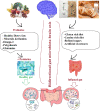The use of biomarkers associated with leaky gut as a diagnostic tool for early intervention in autism spectrum disorder: a systematic review
- PMID: 34517895
- PMCID: PMC8439029
- DOI: 10.1186/s13099-021-00448-y
The use of biomarkers associated with leaky gut as a diagnostic tool for early intervention in autism spectrum disorder: a systematic review
Abstract
Background: Innovative research highlighted the probable connection between autism spectrum disorder (ASD) and gut microbiota as many autistic individuals have gastrointestinal problems as co-morbidities. This review emphasizes the role of altered gut microbiota observed frequently in autistic patients, and the mechanisms through which such alterations may trigger leaky gut.
Main body: Different bacterial metabolite levels in the blood and urine of autistic children, such as short-chain fatty acids, lipopolysaccharides, beta-cresol, and bacterial toxins, were reviewed. Moreover, the importance of selected proteins, among which are calprotectin, zonulin, and lysozyme, were discussed as biomarkers for the early detection of leaky gut as an etiological mechanism of ASD through the less integrative gut-blood-brain barriers. Disrupted gut-blood-brain barriers can explain the leakage of bacterial metabolites in these patients.
Conclusion: Although the cause-to-effect relationship between ASD and altered gut microbiota is not yet well understood, this review shows that with the consumption of specific diets, definite probiotics may represent a noninvasive tool to reestablish healthy gut microbiota and stimulate gut health. The diagnostic and therapeutic value of intestinal proteins and bacterial-derived compounds as new possible biomarkers, as well as potential therapeutic targets, are discussed.
Keywords: Autism; Diet; Gut microbiota; Leaky gut; Probiotics; Short-chain fatty acids; Zonulin.
© 2021. The Author(s).
Conflict of interest statement
The authors declare that they have no competing interests.
Figures



References
Publication types
LinkOut - more resources
Full Text Sources

